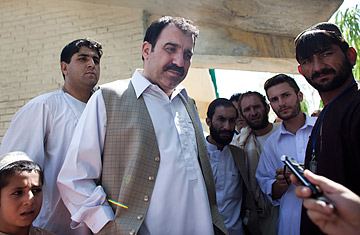
Ahmed Wali Karzai, the provincial council chairman for Kandahar and Afghan President Hamid Karzai's half brother, makes a statement after voting in the presidential elections August 20, 2009 in Kandahar, Afghanistan.
(2 of 2)
Ahmed Wali Karzai was elected in 2005 to head the Provincial Council and soon after, President Karzai reassigned Kandahar governor and powerful political opponent Gul Agha Sherzai to be governor of Nangahar province in the northeast of the country. The president replaced him with an ally of the Karzai family, who was clearly subordinate to Ahmed Wali, even though the governor technically outranks the head of the council. This move effectively gave Ahmed Wali Karzai informal control of Kandahar. In recent years, Karzai's popularity among the people had slipped over corruption and abuse charges.
Nevertheless, on June 30, Harper's Magazine reported that 200 Kandahar elders traveled to Kabul to petition President Karzai to appoint his brother the governor, giving the president's younger brother even more power in a province fractured by tribal infighting and wracked by multiple foreign military offensives to drive out Taliban insurgents concentrated in Kandahar and the Arghandab River Valley, just to the city's north. Such a move might have further strained relations with the U.S. and the West. International advisers have long urged the President to remove his brother from power after the corruption allegations made it harder for Kabul to make credible claims of good governance.
Now, Kandahar is up for grabs. There were three factions — the Karzais, the clan of the tribal leader Mullah Naqibullah and, finally, the ex-governor Gul Agha Sherzai. "Now," says Dashty, "I think what we will see is a power struggle between the two other big families. I think we should expect more rivalry between these two groups and with Ahmed Wali's people."
The political and security chaos caused by the death of Ahmed Wali may be further compounded by an assassination in April. A Taliban bomber blew himself up as he hugged Khan Muhammad Mujaheed, Kandahar's provincial chief of police. The killing left a significant power vacuum in the province that was filled by the nomination of General Abdul Razik the former head of the border police in the border crossing town of Spin Boldak. Over the past few months, a U.S. government official in the province tells TIME, "it appears he is using his position now to take unilateral action against people and communities with whom he has long standing feuds." Although Razik was an ally of Karzai, Afghans fear that violence will exponentially increase on all sides now that even the minor check that Ahmed Wali may have had on Razik has been removed.
Speaking just hours after Ahmed Wali's death, a U.S. government official familiar with the situation in Kandahar told TIME that "It's unclear exactly how all this will play out, in part because it's Kandahar and things change on a daily basis, and also because there are so many power players here in the city. Furthermore, you have powerful district governors out in the districts who all have different tribal allegiances."
Regardless of their tribe and whether they supported or opposed Karzai, the people of Kandahar are now holding their breath, waiting to see what the fallout will be from the murder. "The killing of Ahmed Wali was a big loss for Kandahar because he was the only one who could control the violence between the local Taliban commanders and tribes. We don't think anyone could replace Ahmed Wali in controlling those tribal leaders and local Taliban commanders since they have enmities from a long time ago," says Jawed Watandar, a local journalist in Kandahar. "Now we think that all these local Taliban commanders will come back to the area and start fighting."
